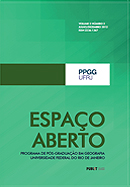Ports as Nodes areas Articulating Local and Global Levels
DOI:
https://doi.org/10.36403/espacoaberto.2014.3306Keywords:
Port, hinterland, hub, space of flows, global and localAbstract
Ports used to be spaces of little interest to researchers when the “inward” development model based on import substitution was in vogue and this was true even for social scientists specialized in regional analysis and economic geography. However, due to recent restructuring of global capitalism, these coastline spaces have become important hubs in global productive networks. This article intends to analyze the spatial and temporal implications of the new role of ports in the articulation of global production and distribution which also give rise to broad spaces of exclusion in areas located away from the ports. Here, the concepts of “flow space”, “network territory” and “simultaneous
space-time” of globalization are revived from the systemic-structural tradition developed in the social sciences, mainly by Braudel and Wallerstein, and applied to regional analysis and economic geography. This line of analysis is shown to have robust explanatory properties in times of restructuring seaport space and global capitalism.



